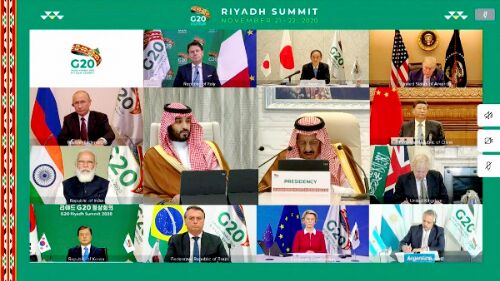Hand in hand

There is little doubt that COVID-19 is one of the formative crises that mankind must overcome. The pandemic has exposed the weaknesses of modern society that for whatever reason saw itself as largely infallible in the face of such crises. The fragility of our health systems, our financial systems and even our core systems of governance was exposed and the world collectively reeled from impact. Now, as we near the possibility of ending the onslaught of the pandemic which is already in its third wave across parts of the world, there is renewed focus on rebuilding what has been lost and making preparations to prevent such disasters from catching humanity similarly unaware next time. There is general consensus in the world community that we are fast approaching challenges of existence that cannot be undertaken by one nation or a group of nations, they require the coordination and support of all nations. The extensive vaccination campaign that will shortly follow will be the largest effort of its kind, requiring global co-ordination for optimum efficiency. The G20 nations have once again reiterated this week the need for ensuring a fair distribution of COVID-19 vaccines, drugs and tests across the world. The top agendas of the Riyadh virtual summit were bringing an end to the pandemic and laying the groundwork for a global economic rebound in 2021. Though ultimately, the conversation shifted to the effects of the pandemic and the economic slowdown on further sharpening already existing inequities across the world. French President Macron emphasised that it was vital for the G20 nations to work to prevent a world where only the wealthy can afford to protect themselves from crises like this pandemic and return to normal. The EU called for the G20 nations to increase funding to the global project for vaccines, tests and therapeutics — Access to COVID-19 Tools (ACT) Accelerator and its COVAX facility to distribute vaccines. Both China and Russia have offered their vaccine expertise to the world at large with the overall message that the G20 nations have a responsibility as the wealthiest nations to help the poorest nations in these trying times.
In addition to the vaccine, the G20 nations are in discussion to extend a freeze in debt-service payment to mid-2021 for the poorest nations while working to come up with a more permanent plan. While some have proposed that the G20 write off all of the debt which it is capable of doing, none of the G20 nations are currently committed to such an action. The time for finding a permanent solution to this debt is running out, however. The President of the World Bank Malpass has warned that unless the G20 finds a permanent solution to this approaching debt crisis, there is a real possibility for the disorderly loan-defaults of the 1980s to repeat and increase global poverty. Another issue that the G20 will take up next time in relation to this one is the issue of African nations debt. While a debt service relief package does exist for affected African countries, few have expressed interests in availing it with others worried that such a debt moratorium would come with a ratings downgrade by agencies like Moody's, a downside that will largely negate any benefits in the long term of availing such a moratorium.
Finally and most significantly, there was a call from the EU side to establish what they termed as an 'international pandemic treaty' which should provide for a ready method to mobilise the necessary global resources and expertise in the event of similar disasters such as the ongoing pandemic. This would address one of the most troubling shortfalls of the global Covid response that dithered initially without direction or planning, costing many more lives than necessary.
Overall, the G20 summit worked to reinforce a message that has become all the more important in the current time, that of multilateralism in all things but specifically that of a new kind of multilateralism that is truly inclusive. Bodies like WTO have already called for a rework of how global trade works so that it benefits the smallest nations as well that are typically cut-off. Of course, not everyone supports the course of multilateralism and demagogues will likely continue calling for a nationalistic stance in all things but there is enduring hope that such voices will be increasingly marginalised as time goes by and the world prepares to wake up from this long Covid nightmare.




